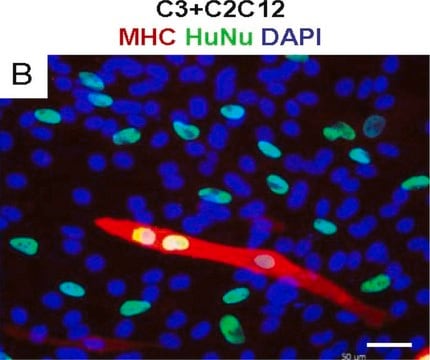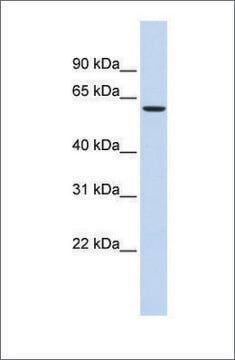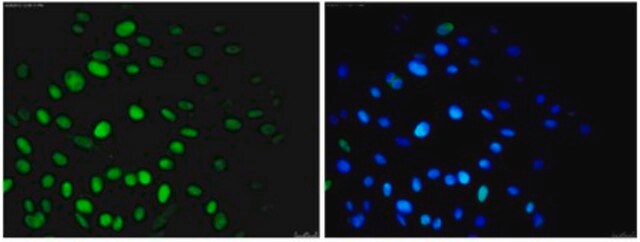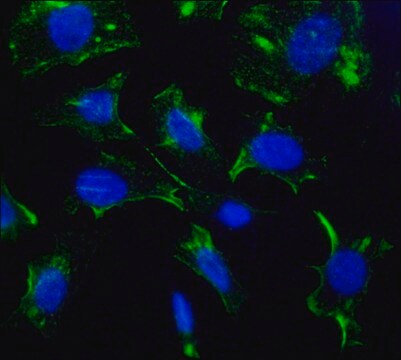MAB1281C3
Anti-Nuclei Antibody, clone 235-1, Cy3 conjugate
clone 235-1, from mouse, CY3 conjugate
Synonym(s):
HuNu
Sign Into View Organizational & Contract Pricing
All Photos(4)
About This Item
UNSPSC Code:
12352203
eCl@ss:
32160702
NACRES:
NA.41
Recommended Products
biological source
mouse
Quality Level
conjugate
CY3 conjugate
antibody form
purified immunoglobulin
antibody product type
primary antibodies
clone
235-1, monoclonal
species reactivity
human
technique(s)
immunocytochemistry: suitable
isotype
IgG1
shipped in
wet ice
target post-translational modification
unmodified
General description
Cell replacement techniques such as stem-cell or fetal-cell therapies show great promise for many diseases. Cross-species grafting between human and animal cells or tissues requires the identification and localization of the donor material in the host environment. Antibodies to human-specific nuclei are useful cytological and histological markers for identifying human cells in xenograft models. MAB1281 stains nuclei of all human and primate cell types giving a diffuse nuclear staining pattern. Chromosomes are negatively stained in metaphase cells. The antibody does not react with nuclei from mouse or rat.
Immunogen
Human nuclei
Application
Evaluated by Immunocytochemistry in human bone marrow mesenchymal stem cells (SCR108). Immunocytochemistry Analysis: A 1:100 dilution of this antibody detected nuclei in human bone marrow mesenchymal stem cells (SCR108). Evaluated by Immunocytochemistry in H9 human embryonic stem cells. Immunocytochemistry Analysis: A 1:100 dilution of this antibody detected nuclei in H9 human embryonic stem cells. Evaluated by Immunocytochemistry in mouse embryonic fibroblasts. Immunocytochemistry Analysis: A 1:50 dilution of this antibody did not detect nuclei in mouse embryonic fibroblasts.
Research Category
Stem Cell Research
Stem Cell Research
Stem Cell Research
Stem Cell Research
Research Sub Category
Pluripotent & Early Differentiation
Developmental Neuroscience
Mesenchymal Stem Cells
Neurodegenerative Diseases
Pluripotent & Early Differentiation
Developmental Neuroscience
Mesenchymal Stem Cells
Neurodegenerative Diseases
The anti-Nuclei, clone 235-1, Cy3 conjugate will recognize human cell nuclei only & is usefull in xenograph transplantation studies to study stem cell migration.
Quality
Evaluated by Immunocytochemistry in human foreskin fibroblasts (SCC058). Immunocytochemistry Analysis: A 1:50 dilution of this antibody detected nuclei in human foreskin fibroblasts (SCC058).
Physical form
Protein G Purified
Purified mouse monoclonal IgG1 conjugated to Cy3 in PBS with 0.1% sodium azide and 15mg/ml BSA.
Storage and Stability
Maintain refrigerated at 2-8ºC protected from light in undiluted aliquots for up to 6 months from date of receipt.
Analysis Note
Control
Human foreskin fibroblasts (SCC058)
Human foreskin fibroblasts (SCC058)
Other Notes
Concentration: Please refer to the Certificate of Analysis for the lot-specific concentration.
Disclaimer
Unless otherwise stated in our catalog or other company documentation accompanying the product(s), our products are intended for research use only and are not to be used for any other purpose, which includes but is not limited to, unauthorized commercial uses, in vitro diagnostic uses, ex vivo or in vivo therapeutic uses or any type of consumption or application to humans or animals.
Not finding the right product?
Try our Product Selector Tool.
Storage Class Code
12 - Non Combustible Liquids
WGK
WGK 2
Flash Point(F)
Not applicable
Flash Point(C)
Not applicable
Certificates of Analysis (COA)
Search for Certificates of Analysis (COA) by entering the products Lot/Batch Number. Lot and Batch Numbers can be found on a product’s label following the words ‘Lot’ or ‘Batch’.
Already Own This Product?
Find documentation for the products that you have recently purchased in the Document Library.
Ludovic Zimmerlin et al.
Methods in molecular biology (Clifton, N.J.), 2416, 133-156 (2021-12-07)
Tankyrase/PARP inhibitor-regulated naïve human pluripotent stem cells (TIRN-hPSC) represent a new class of human stem cells for regenerative medicine that can differentiate into multi-lineage progenitors with improved in vivo functionality. Chemical reversion of conventional, primed hPSC to a TIRN-hPSC state
Eleana Manousiouthakis et al.
Journal of tissue engineering and regenerative medicine, 13(9), 1712-1723 (2019-07-07)
Bidirectional interactions between the human central nervous system and the gastrointestinal tract, via the enteric nervous system, are unmapped and central to many human conditions. There is a critical need to develop 3D human in vitro intestinal tissue models to
Hyun Ju Lee et al.
Journal of immunology (Baltimore, Md. : 1950), 194(8), 3634-3645 (2015-03-15)
Exogenously administered mesenchymal stem/stromal cells (MSCs) suppress autoimmunity despite transient engraftment. However, the mechanism is unclear. In this study, we report a novel mechanism by which MSCs modulate the immune system by recruiting myeloid-derived suppressor cells in a mouse model
Youya Nakazawa et al.
Scientific reports, 8(1), 4013-4013 (2018-03-07)
Recent studies suggest a functional involvement of Epithelial-Mesenchymal Transition (EMT) in tumor chemoresistance. Specifically, EMT is associated with chemoresistance and poor prognosis in triple-negative breast cancer. However, no effective therapy targeting EMT has been developed. Here, we report that periostin
Tetsuro Tamaki et al.
Frontiers in physiology, 6, 165-165 (2015-06-18)
Skeletal muscle makes up 40-50% of body mass, and is thus considered to be a good adult stem cell source for autologous therapy. Although, several stem/progenitor cells have been fractionated from mouse skeletal muscle showing a high potential for therapeutic
Our team of scientists has experience in all areas of research including Life Science, Material Science, Chemical Synthesis, Chromatography, Analytical and many others.
Contact Technical Service








